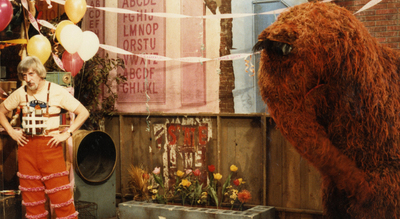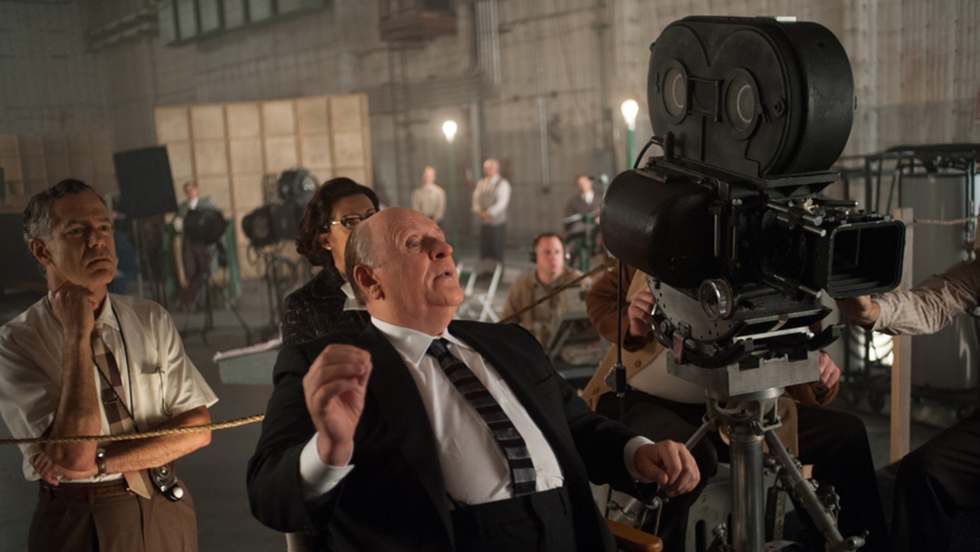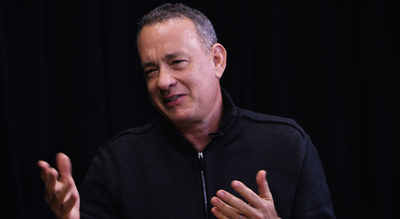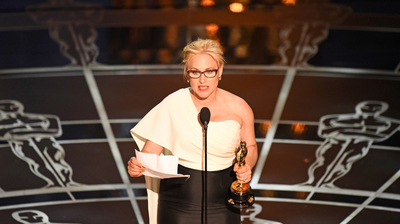
BY KAREN KEMMERLE |
The (Other) Men of Hitchcock: Huston, Stuhlbarg and D'Arcy
Anthony Hopkins's performance as the master of macabre in 'Hitchcock'; is deservedly garnering a lot of attention. Equally impressive are the supporting players: Danny Huston, Michael Stuhlbarg, and James D'Arcy. The film opens this Friday.

Much is known about the public life of Alfred Hitchcock, the iconic director and master of suspense, but what about the quieter moments of the man truly behind the curtain? The soon-to-be released Hitchcock seeks to fill in those blanks.
Adapted from Stephen Rebello’s famous book about the making of Psycho, the multi-layered screenplay by John J. McLaughlin (Black Swan) provides a revealing study of the famous director’s state of mind during the making of his most famous and controversial picture, Psycho. Starring Anthony Hopkins, Helen Mirren, Toni Collette, Scarlett Johansson and number of esteemed supporting actors—James D’Arcy, Michael Stuhlbarg and Danny Huston, to name a few—Hitchcock has all the ingredients to be one of the biggest movies of the holiday (and award) season.
McLaughlin and director Sacha Gervasi faced a difficult task: how to explore the inner life of one of Hollywood’s most public personas? The two men decided on a remarkably effective approach: focusing on Hitchcock’s relationship with his wife, Alma Reville (Mirren), during this most tumultuous of shoots. The two mortgaged their home and essentially went to war with the Hollywood establishment, consisting of timid studio heads, stubborn censors, and reluctant bankers. Alma also struggled with Hitchcock’s growing obsessions and the arduous casting process.
Fortunately, Psycho became their greatest collaboration and is still widely considered to be one of the best films of all time; its impact and influence on filmmakers continue to this day. Tribeca was fortunate to have opportunity to speak with three members of Hitchcock’s strong supporting cast.
Michael Stuhlbarg, who plays Hitchcock’s legendary agent Lew Wasserman, shared with us his first reactions to the script, “There was something about this screenplay that was almost like a Hitchcock film about a Hitchcock film. There was the love story, there was the suspense, there was fear, there were the gruesome elements that went unspoken, and that trademark wicked sense of humor.”

James D’Arcy, who took on the demanding role of Anthony Perkins, did not really know much about the love story that forms the center of the film. He explained: “It wasn’t what I initially expected. I thought it was just going to be about the making of Psycho, and it’s much more about Hitchcock’s relationship with Alma. I found that incredibly interesting. Their story is set against the backdrop of Psycho, so you’re dipping into this iconic world that you, as a viewer, know very well, but the film goes in this totally different, totally fascinating direction.”
The two found research on their characters easy to perform. In addition to dipping into numerous books on Hitchcock, Stuhlbarg spoke to producers on set who had actually worked with the real-life Wasserman. Stuhlbarg wryly observed: “I knew nothing about him when I first started on the project—which is the way he would have wanted it. He didn’t like anyone knowing anything about him. When I started to meet people who had actually worked with Lew, they gladly shared their experiences with me. In this story, Lew is a tangential character, but I really enjoyed getting to know more about him.”
Wasserman was extremely vital to the making of Psycho and established the now well-established system of back-end points for Hitchcock, to help him recoup his investment after paying for the film out of his own pocket. Stuhlbarg added, “They actually gave me four-inch lifts. When you play a person who was so larger-than-life and accomplished so much, you have to feel the part as well. He was an icon of the industry. The best thing you can do is honor what [such a character] did and infuse [him] with your own experiences as well.”
D’Arcy had actually known about an earlier version of the script for this film and then came back to the project: “The film, for whatever reason, lost financing and it just went away. About 5 years later, Sacha, who is an old friend of mine, told me he was interested in the project, so I read it again and went off to film Cloud Atlas. When I got back, I spoke to Sacha and they were in the casting process, so I just went along with it from there.” D’Arcy, in addition to watching the films of Anthony Perkins, took to YouTube. “I watched interviews with Tony online from different talk shows. It was important to study his speech patterns, because he has such a peculiar way of speaking.”
Danny Huston, son of legendary director John Huston, had to find other ways to explore his character. Huston plays Whitfield Cook, a writer who worked with Hitchcock on Strangers on a Train and Stage Fright. Over the course of the film, Whitfield begins to write with Alma, filling a void left by her absentee husband. Gradually, the two form an attachment. Huston explained: “Whitfield, in the script, was almost like a Hitchcockian character himself. He’s this breezy character, perhaps a bit of a hack, who is not as talented as he paints himself to be. For Alma, he offers up himself almost unknowingly as a foil to Hitchcock—though not as an artist. He would never mortgage his home like Hitch did for the sake of his work.”
The majority of Huston’s scenes were spent with Mirren. He reported: “The most exciting part for me, from an actor’s point of view, was to give the film a bit of romance with Helen Mirren’s character. What develops between Whitfield and Alma wasn’t calculated on his part; it just sort of happens. However, he cannot escape his true caddish nature.”
As the film proves, Alma and Hitchcock’s relationship endured, despite his obsessions with his blondes. The Whitfield/Alma flirtation in the film adds a bit of playfulness that helps balance the film’s more gruesome aspects, such as Hitchcock’s fascination with serial killer Ed Geins, masterfully played in a non-sensationalist way by Hopkins.

So what about Hopkins? His co-stars have nothing but praise for him. D’arcy shared, “Tony actually came to my audition. I’ve never heard of a leading actor that comes in to read sides with people. We improvised for about 15 minutes, and he was actually really bad at it.” D’arcy laughed, “When I spoke in what I felt was an approximation of Anthony Perkins’s voice, Tony would burst out laughing. We had to start over 3 times. He kept looking at Sacha and apologizing saying, ‘I’m sorry. It’s just so uncanny!’”
Stuhlbarg recalled his first encounter with the Oscar-winning actor: “He left me a message on my cell phone. When I got the part, Sacha called to tell me the news and I could hear him handing the phone over to Tony. Tony gets on the line and says, ‘Good evening,’ in a pitch-perfect imitation of Mr. Hitchcock’s voice.” Stuhlbarg continued, “He’s unbelievably generous too. I casually told him I was from California and my parents still lived there, and he asked me to bring them to the set! Often times, the lead actor of any particular piece can set the tone during the shoot. He just made it a joy everyday.”
Huston praised director Sacha Gervasi for knowing how to get the best work from his actors “He was absolutely wonderful in the sense of encouraging that lightness that Helen and I wanted to bring to our scenes. He even let us go off book if we wanted to, and let us be playful. There was never a sense of constraint.” He went on, “Sacha was very giving. He’s a good actor’s director, because his notes are not smothering in any way. Sacha helped developed the script and practically lived with the material for a long time. He knew what he wanted, but at the same time, was very encouraging to us and the crew, in order to get the best out of everybody and see what they brought to the table.”
Gervasi (whose previous directing credit was the fabulous documentary, Anvil: The Story of Anvil) made an incredible leap by next tackling a complicated biopic about one of the greatest directors that ever lived. D’Arcy mused about Gervasi’s accomplishment: “I think it’s hard, especially for this picture, to thread the needle of the story you want to tell. There are a number of different strands coming together, and Sacha just sewed them all perfectly.”
And, indeed, Gervasi did manage to strike a unique balance between the many different complex themes, bringing forth a cohesive picture. D’Arcy added: “You just find yourself getting caught up in it. You’re reminded how much fun it is to make movies. Nothing ever got Sacha down or panicked him. He was a natural. Having now seen the film, you can tell that it signals the arrival of a very serious filmmaker. I can’t wait to see what Sacha does next.”
Hitchcock opens this Friday in select cities, with a wider rollout to come in the next few weeks. In the meantime, go out and explore the filmography of Alfred Hitchcock. You’ll be glad you did!
 Like Hitchcock on Facebook.
Like Hitchcock on Facebook.
 Follow Fox Searchlight on Twitter.
Follow Fox Searchlight on Twitter.

